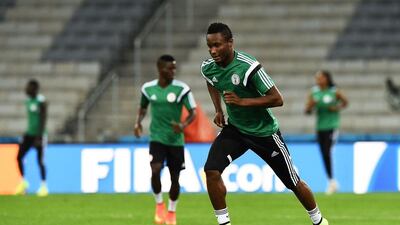CURITiBA, BRAZIL // This week, as Nigeria prepared for a fifth World Cup, one of the country's media outlets described John Obi Mikel as "a Jekyll-and-Hyde player".
He is a strange case, indeed.
Derided at Chelsea, often employed as a defensive shield in midfield, Mikel is known as the kid they stole from under the noses of Manchester United, who never grew into the star they expected him to become.
Click here to visit The National's dedicated World Cup 2014 landing page
Perpetually unadventurous, the ball is retrieved or received and typically rolled a few yards to a receptive teammate.
He has been supplanted in the Chelsea first team by Nemanja Matic; Jose Mourinho is not a Mikel fan. Yet he should be.
Having first caught the eye at the 2003 Fifa Under 17 World Championship in Finland and then at the World Youth Championship two years later, the imposing midfielder seemed custom built for a career at the heart of a top European side.
His time at Chelsea has been relatively disappointing given that he arrived after a transfer battle with United.
Contrast that with his form for Nigeria, though, and the comparisons with Dr Henry Jekyll and his alter ego become clear.
With his national team, Mikel usually has a transformation. The shackles that inhibit at club level are discarded by his country and he takes shape as the side's creative fulcrum, with a cohesive touch and a thunderous shot.
Last year, the Super Eagles defeated the Ivory Coast, the favourites, en route to clinching a third African Cup of Nations. Mikel was key.
His displays impressed sufficiently that he finished as runner-up to Yaya Toure in the race for African footballer of the year.
Then, at the Confederations Cup in Brazil, he scored a memorable goal against Uruguay, with a missile launched high into the net. Now back in Brazil, Mikel is viewed as Stephen Keshi's go-to guy. Much is expected of the World Cup debutant, who missed out on South Africa four years ago because of injury.
Nigeria are in Group F with Argentina, Bosnia-Herzegovina and Iran, and some believe Mikel can lift his side past the pool stages.
This squad may not boast players similar in ability to Jay-Jay Okocha, Sunday Oliseh and Nwankwo Kanu, but results from 2013 have led to higher hopes within Africa's most populous country.
"We know we're the African champions and people expect us to do well, to represent the African continent," Mikel said ahead of Monday's opener against Iran. "That's a bit more extra pressure, but it's pressure that we love. We love to be African champions.
"I have to make sure I lead by example. We are all driving in the same direction. We all know what we want and hopefully we will have a good tournament."
To do that, Nigeria must improve on a less-than-stellar World Cup record. In 1994 and 1998, they advanced to the second round, but four years later they bowed out at the first stage.
In 2010, they were so bad that the Nigeria president, Goodluck Jonathan, suspended the national team from competition for two years. The ban was quickly rescinded after a Fifa threat of sanction. However, a tally of two points from their past six World Cup matches tells a story.
In their final friendly this month, against the United States, everything good stemmed from Mikel for 45 minutes, before he was withdrawn. Nigeria's midfield then withered. He is that important.
Hailed, somewhat unfortunately, as Okocha's successor, Brazil offers the opportunity to live up to that comparison.
The constantly contradictory Mikel needs to at last banish his darker side.
jmcauley@thenational.ae
Follow us on Twitter @SprtNationalUAE

Chelsea’s John Obi Mikel set for ‘Jekyll’ turn for Nigeria
Described as a 'Jekyll-and-Hyde' player, Nigeria fans can rest easy knowing the good Mikel shows up for the Super Eagles, writes John McAuley from Brazil.
Most popular today

